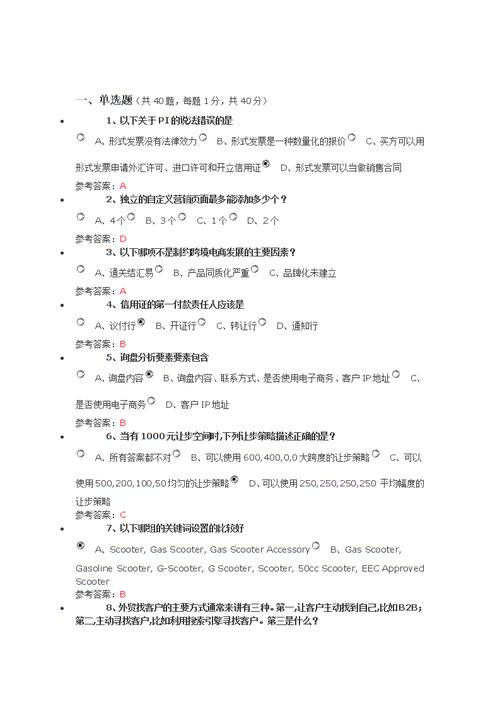1.Whatiscross-bordere-commerce?
Cross-border E-commerce Interview Questions
Preparing for a cross-border e-commerce interview in English? Here are some common questions you might encounter:
Answer: Cross-border e-commerce refers to online trade between a business (or consumer) in one country and a customer in another country. It involves selling products or services across international borders through online platforms.
Answer: Some of the key challenges in cross-border e-commerce include language barriers, cultural differences, varying regulations and tariffs, logistics complexities, and payment processing issues.
Answer: To ensure compliance with international regulations, it is important to conduct thorough research on the legal requirements of each target market, work with legal experts if necessary, and implement robust compliance processes within the organization.

Answer: Some strategies to expand a cross-border e-commerce business include market research to identify new opportunities, localization of the website and marketing content, partnerships with local distributors or influencers, and providing excellent customer service tailored to each market.
Answer: Handling cross-border shipping and logistics requires careful planning and coordination with reliable international shipping partners. It is important to consider factors such as customs clearance, shipping costs, delivery times, and tracking capabilities to ensure a smooth customer experience.
Answer: Technology plays a crucial role in cross-border e-commerce by enabling online transactions, managing inventory and orders, providing data analytics for decision-making, and enhancing the overall customer experience through features like personalized recommendations and secure payment gateways.
Answer: To address currency exchange and payment processing challenges, businesses can use multi-currency payment gateways, offer various payment options to cater to different customer preferences, and implement fraud prevention measures to ensure secure transactions across borders.
Answer: The benefits of cross-border e-commerce for businesses include access to a larger customer base, diversification of revenue streams, opportunities for growth in new markets, and the ability to leverage global trends and consumer preferences to stay competitive.
Answer: Success in cross-border e-commerce can be measured through key performance indicators (KPIs) such as conversion rates, customer acquisition costs, return on investment (ROI), customer satisfaction scores, and market share growth in target markets.
Answer: Some trends shaping the future of cross-border e-commerce include the rise of mobile shopping, the increasing use of artificial intelligence and machine learning for personalized shopping experiences, the growth of cross-border marketplaces, and the focus on sustainability and ethical sourcing practices.
These are just a few examples of the types of questions you may encounter in a cross-border e-commerce interview. It's important to be prepared to discuss your knowledge of the industry, your experience with international markets, and your strategies for overcoming the challenges of selling across borders.
